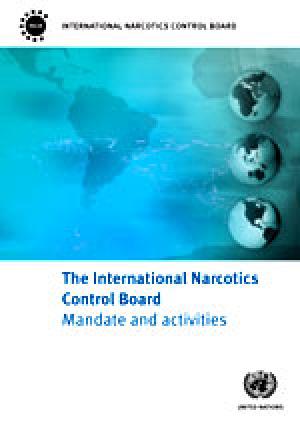A federal prosecutor in Miami seems to have real problems practicing her profession within the rules of the game, particularly if drugs are involved.
Veteran investigative journalist Radley Balko has delivered a masterwork on the rise of American's militarized police. "Rise of the Warrior Cop" is a must-read for those of us wondering how we got in this sorry mess and how we can ever get out.
Now more than ever, StoptheDrugWar.org needs your financial support to continue to provide this crucial informational tool that builds and empowers the movement. We have a special new offer for those donating $50 or more, which this post provides some updated information about.
Gov. Pat Quinn (D) Thursday signed into law the Compassionate Use of Medical Cannabis Act, making Illinois the 21st medical marijuana state.
The UN anti-drug bureaucracies, charged with upholding the global drug prohibition regime, are eying Uruguay nervously after its lower house voted to approve legal, state-run marijuana markets.
A Reuters investigative report has shone a light on a publicity-shy DEA unit that uses information from NSA surveillance and other sources to jump start criminal investigations, then hide their origins.
Illinois joins the ranks of the medical marijuana states; meanwhile, Connecticut, Massachusetts, and New Jersey are moving to put their medical marijuana programs in place, and there's more news, too.
Norway's Green Party is calling for state-controlled marijuana production and sales, and the decriminalization of possession of all drugs. Will anyone in Norway listen?
There will be no meaningful effort to eradicate Lebanese marijuana fields this year. The security situation is too tense, financial compensation for last year hasn't appeared, and the farmers are too angry. Hash heads from Cairo to Ankara to Berlin are smiling.
A pair of Indiana prison guards get in trouble over weed in separate incidents, a Florida deputy is apparently having way too much fun, and an Alabama cop gets nailed in a cocaine sting.
Interns are making an important difference fighting the good fight with us at StoptheDrugWar.org.
special to Drug War Chronicle by Houston-based investigative journalist Clarence Walker, [email protected]
Part 6 in a series, "Prosecutorial Misconduct and Police Corruption in Drug Cases Across America."
There is something rotten in Miami. A federal prosecutor there, Assistant US Attorney Andrea Hoffman, seems to have problems staying within the bounds of the law as she attempts to prosecute major drug cases. As a result, cases are coming undone, and some Colombians are going home, some who likely were innocent. And Hoffman's pattern of prosecutorial misconduct has so far come without serious professional consequences.

2011 press conference in Bogota announcing the 56 indictments (presidencia.gov.co)
On September 2, 2011, US Attorney for the Southern District of Florida in Miami
Wilfredo Ferrer announced the arrest of 56 Colombians in a trio of separate foreign investigations -- Operation Seven Trumpets, Operation Under the Sea, and Operation
BACRIM (
Bandas Criminales). In what was one of America's biggest drug busts, authorities also seized 21 airplanes, 12 submarines, millions of dollars in cash, and more than 20 tons of cocaine and heroin.
"Together with our law enforcement partners in Colombia, we have developed a proactive strategy to combat the rise of narco-trafficking operations to eliminate the threat they pose to the security of the international community," Ferrer crowed at a press conference with Colombia President Santos and Prosecutor General Viviane Morales in Bogota that day.
But what appeared to a slam-dunk case validating America's never-ending war on drugs soon went sideways, and Hoffman was there. Two Colombian nationals arrested in the case, John Winer and Jose Buitrago, who were looking at life in prison without parole, are now free men after federal District Court Judge Marcia Cooke ruled earlier this year that Hoffman deliberately withheld key evidence from the defense, undermining the defendants' rights to a fair trial.
And that's just for starters.
Winer and Buitrago
On May 21, a jury had already been seated to hear the case against Winer, represented by attorney Jose Quinon, and Buitrago when the latter's defense attorneys, Kashap Patel and Helen Batoff, got DEA agents and a Colombian narcotics officer to acknowledge they knew the DEA was making monthly payments to "vetted units" of the Colombian narcotics police -- and that prosecutor Hoffman also knew about those payments.
"Vetted units" are elite anti-drug squads whose members have passed muster as not being corrupt, and are often used by the DEA and other agencies in their overseas investigations. These units are required to file monthly reports on their activities in order to justify incurred expenses paid for by the DEA as part of US foreign assistance to Colombia to wage the drug war.
Hoffman denied any previous knowledge of the payments to the vetted units.
But on the stand that day, Colombian police officer Pacheco blew up Hoffman's denials about the DEA payments. Pacheco said the matter about the money was discussed between him, Hoffman, and DEA agent Guillermo Turke upon arriving in Miami from Bogota on Sunday, May 14th.
Attorneys Patel and Batoff had already been tipped-off about the use of the vetted units in the case against their clients, and prosecutors acknowledged as much, but refused to disclose information about their role in the case unless the defense attorneys could prove they were entitled to it.
Under the Brady rule, the government is required to turn over exculpatory evidence or material information in the government's possession that could be favorable to a defendant.
"The defense sent a written request to get the documents from Hoffman and her co-counsel, Cynthia Wood, on April 3, 2013," Patel told Judge Cooke. Receiving no reply from Hoffman, defense attorneys re-sent the letter and, on May 1, received a reply from Hoffman's office acknowledging that the payment information existed, but demanding that the defense explain how it was entitled to that information.
"Tell me why it's Brady material, or under what theory you are entitled to it," prosecutor Christina Maxwell responded.
"The DEA payments to Colombian officers were disclosable to the defense without them having to file a Brady motion to get them," harrumphed Washington, DC, criminal defense attorney Stephan Leckar in an interview with the Chronicle.

US District Court Judge Marcia Cooke didn't let Hoffman get away with misconduct. (stu.edu)
Judge Cooke suspended the trial to hold a hearing on the matter, and things only got worse for Hoffman. Cook and the defense attorneys grilled a bevy of DEA agents, and they testified that Hoffman had known about the payments at an earlier date.
Bogota DEA Special Agent Guillermo Turke reiterated Pacheco's testimony that the "payments were specifically discussed with Hoffman on May 19th".
Miami DEA Corrine Martin told the frustrated judge "after all of the court motions, we spoke with DEA Special Agent Ed Reed about the payments and we also let Ms. Hoffman know."
Replying to a question from Judge Cook, Miami DEA Special Agent Mike Torbert concurred.
"I discovered there was a $200 operational expense given to SIU (special investigation units)," he told the court. "I passed the information to Ms. Hoffman."
Although her office had responded to defense letters about the payments on May 1, acknowledging they had occurred, Hoffman insisted to Judge Cooke that she had first found out about them on May 20, on the eve of the trial. But when Cooke pressed, Hoffman revised.
"Your honor, I found out about the payments at noon on May 21," she then replied.
But after hearing the defense evidence that Hoffman in fact knew about the money paid to the Colombian sources before the trial started, Judge Cooke accused Hoffman of prosecutorial misconduct, or intentionally engaging in inappropriate or illegal behavior by withholding evidence or knowing permitting false testimony and tampering with witnesses. Hoffman had violated the Brady rule by not automatically turning over materially important evidence to the defense prior to trial and when the trial started.
Had defense attorneys been given the information by Hoffman about the DEA payoffs, the wiretaps in the Winer-Buitrago case could have been challenged and used to impeach witnesses, the attorneys argued. "The scope of the defense would've been different," Patel explained to the judge.
Hoffman apologized to the court, blaming her misconduct on miscommunications due to language barriers, but Judge Cooke wasn't buying it.
"I think the US government was aware of Colombian police officers receiving payments and did not disclose it to the defense," an angry Cooke replied. "The prosecutor was ethically and legally bound to turn the information over. This does not make sense to me. This is all you do. Answer this: Why does the government get a pass?"
Defense attorneys moved to have the case dismissed because of Hoffman's misbehavior.
"The government's conduct deprived the defendants of their constitutional rights to due process," the attorneys wrote. "Such flagrant disregard for the rule of law and brazen dishonesty to the court and to opposing counsel should 'shock' the court's conscience."
Judge Cooke denied the motion to dismiss but a deal was struck. Winer and Buitrago both pleaded guilty to a lesser charge of conspiracy to transport cocaine and were sentenced to 36 months, with credit for the two years they had already been behind bars pending trial. Both men were subsequently released from custody.
Winer and Buitrago and the Practice of Information Buying and Selling
The little matter of the Brady rule violation in the area of the vetted units wasn't Hoffman's only problem in the Winer-Buitrago case. Defense attorneys also accused her of failing to disclose a letter indicating that another Colombian, Daniel Bustos, who was facing years in prison on a cocaine conspiracy charge, had paid money to another drug defendant, Fabian Cruz, so that Cruz would use his informant connection with prosecutors or outsiders to obtain "inside information" about evidence in the Winer-Buitrago case and feed it to Bustos. Then, Bustos and other defendants could use that information to testify falsely for the prosecution against the Operation Seven defendants in exchange for leniency.
But Assistant US Attorney Hoffman rejected a defense request to obtain the whistleblower letter exposing the dealings between Bustos and Cruz. In the courtroom, Hoffman confirmed that the letter existed, and Judge Cooke gruffly ordered her to produce it for the defense, again citing the Brady rule. At the time, Bustos and Cruz were already on the prosecutors' witness list.
This underground scheme is called "buying and selling" evidence (fake or real) for a defendant to get on the bus with the Feds and ride all the way home to freedom. In a December 2012 story in USA Today, reporter Brad Heath exposed the inner workings of the practice, illustrating how prisoners game the system by buying and selling evidence against other defendants with pending drug cases, then using that bought information to testify for the prosecution in exchange for sentence cuts and early freedom.
That report found that "one out of eight" federal drug convicts had their sentences reduced for helping prosecutors. Similarly, the Houston Chronicle reported that federal judges last year "resentenced 1,738 inmates nationwide after they provided substantial assistance" to investigators and prosecutors.
The corrupt scheme works like this: An inmate with outside connections (or already an informant) will have relatives and friends collect information on the street about a drug dealer's operation, or have operatives to dig up additional information about a dealer awaiting trial. Then the inmate will sell the collected information to prisoners who have money but are short on facts or criminal contacts to cooperate with the government on their own.
Daniel Bustos was hoping to lessen his sentence by paying Cruz to get information on Winer and Buitrago and then using that information to testify against them. And Hoffman was prepared to let him until defense attorneys blew the whistle.
Hoffman has not been officially sanctioned by the court for her misconduct in the Winer-Buitrago case. A court worker told the Chronicle recently that while the matter was under consideration, no ruling had been issued, and Hoffman was still assigned to Cooke's courtroom.
A Miami public affairs spokesman for US Attorney's Office for Florida Southern District declined to comment.
That's not the end of the trouble in Miami. Operation Seven Trumpets and its prosecutors have taken more hits, with other Colombians who had been indicted in the operation and extradited to the US being released and sent home after the charges turned out to have been unfounded.
Carlos Ortega Bonilla

Carlos Ortega Bonilla hugs his son as he is released. (seitleslaw.com)
Carlos Ortega Bonilla and William "Willy" Gil-Perenguez, both Colombian nationals, were arrested and extradited to the US as part of operations Seven Trumpets and BANCRIM. Both were thrown into the Miami Federal Detention Center to await trial on cocaine charges, and both faced up to life in prison if convicted.
Ortega Bonilla, the former head of Colombia's Flight Security (the equivalent to the Federal Aviation Administration), was enjoying his retirement in Bogota when agents armed with paramilitary-style weapons swarmed his home and arrested him.
"You have been indicted for supplying airplanes to traffickers to ship tons of cocaine to other Latin countries and the US," one of the drug agents told him. The agent explained that Ortega Bonilla's voice had been heard on wiretaps selling planes to drug dealers, in particular one Alvaro Suarez, a veteran trafficker who had once worked as a pilot for legendary Medellin Cartel capo Pablo Escobar.
Protesting his innocence all the while, Ortega Bonilla was imprisoned in Bogota while he unsuccessfully fought extradition to the US. He was eventually transferred to Miami, where he languished in jail as he sought to prove his innocence, but that was an extremely hard sell for Assistant US Attorney Hoffman.
"I never worked harder in my life," Miami criminal defense attorney Mark Seitles told the Daily Business Review about his attempts to convince Hoffman to drop the charges.
Seitles immediately hired Ed Kacerosky as an investigator. Kacerosky is a highly decorated former US Customs Agent credited with helping the Feds dismantle the infamous Cali Cartel. Ironically as an agent, Kacerosky had worked closely on previous major drug cases with Hoffman.
Authorities targeted Ortega Bonilla, tapping his phone, but failed to provide evidence that any airplanes he sold were linked to drug trafficking. The key to his freedom would lie in the wiretaps.
"Kacerosky realized after hearing the wiretaps that there was a gross misidentification, and they indicted my client Ortega for acts of another guy named Carlos," Seitles explained.
At an August 14, 2012, hearing in the courtroom of Judge Cooke, Seitles explained that his client had been wrongfully indicted on drug crimes and that his own investigation discovered irrefutable evidence the feds had misidentified his client's voice on the wiretaps.
As a plane broker, Ortega Bonilla sold or leased aircraft, and someone had convinced the feds that he was dirty. But they were wrong.
"Ortega Bonilla's voice was on the wiretaps in one plane deal where he determined that the men who sought the aircraft were drug dealers," Seitles explained. "And he refused to do the deal. No plane was ever sold and emails sent by Ortega Bonilla to the men showed he refused to do business with drug traffickers. There are even recorded calls with Ortega Bonilla attempting to contact the FBI to tell them about this. And the affidavit in support of extraditing Mr. Ortega Bonilla mentioned seven planes and no mention of that airplane, which was an E-90."
The seven planes in question actually belonged to another Carlos, Honduran drug dealer Carlos Litona, Seitles explained.
But Hoffman was having none of it. She argued to Judge Cooke that she had a witness, a co-defendant willing to testify that Carlos Ortega Bonilla was the right guy. Seitles countered in a separate hearing, putting Kacerosky on the stand with the wiretap tapes to explain how he had uncovered evidence that the feds had fingered the wrong man.
"The real guy is Carlos Litona," Kacerosky told the judge.
Without calling her secret witness, Hoffman dropped the charges on August 31.
When Ortega's family arrived at the airport in the Colombian capitol, hundreds of supporters surrounded them, hugging him with teary eyes and wishing him well. But his problems aren't over.
"Ortega Bonilla's US visa has been revoked, and he's having a hard time accepting that he was in custody for a crime he did not commit," Seitles told the Chronicle.
Ortega Bonilla has hired a Colombian attorney to file a lawsuit there and is currently searching for legal representation in the US to file a lawsuit here.
William "Willy" Gil-Perenguez
In June 2006, DEA and Colombian National Police jointly investigated a widespread conspiracy among multiple defendants importing cocaine and heroin on cargo planes traveling from Colombia and landing at Miami International Airport. DEA picked up the name of a cargo worker named "Willy" who supposedly was part of the conspiracy. An informant even identified "Willy" 's voice on wiretaps.
Willy Gil-Perenguez was living the good life at the time in Cali. He had a beloved girlfriend and a decent job, working for the Girag cargo air freight company. But in June 2007, his good life came to a screeching halt, when Colombian drug agents arrested him, believing he was the "Willy" overheard on the drug investigation wiretaps.
He was taken to a DEA office in Colombia, where agents threatened him, telling him to cooperate with them or they could make a phone call and have him sent to prison for 30 years. Gil-Perenguez maintained his innocence, saying he had no idea what they were talking about. In September 2008, he was extradited to Miami to face assorted drug charges that potentially carried a maximum penalty of life in prison.
Facing the wrath and the resources of the US government, Gil-Perenguez caught a lucky break while sitting at the Miami Federal Detention Center awaiting trial. He encountered another detainee, Neixi Garcia Lamela, a major target of Operation Seven Trumpets, who had agreed to cooperate with the feds. But he had bombshell news for Gil-Perenguez.
"DEA agents and Hoffman tried to pressure me to implicate you but I refused, because I knew I would be fabricating testimony to implicate an innocent person," Garcia Lamela told Gil-Perenguez, according to a lawsuit he later filed.
Gil-Perenguez immediately contacted his attorney, Luis Guerra. Guerra relayed to Hoffman the information about Garcia Lamela's admission that his client was innocent.
"I went to Hoffman and said, 'You have the wrong guy. My guy is innocent,'" Guerra told Law.com. "She said she had other witnesses. Turns out the witnesses never existed," Guerra recounted.
After serving 19 months behind bars, which included one year in Colombia's Combita lockup, a place described by human rights activists as one of the most oppressive and notorious prisons in the world, US District Judge Donald Graham freed Gil-Perenguez in February 2009, finding that his voice had been wrongfully identified on the wiretaps.
Gil-Perenguez returned to Colombia wearing a "bad jacket." His fellow countrymen think he snitched on others to be released so early. He filed a $10 million wrongful arrest lawsuit against the US government, charging that he had been left jobless and in pain and suffering. But the US 11th Circuit Court of Appeals threw out the lawsuit, ruling that the US lacked jurisdiction and that it couldn't be sanctioned for "any claims arising in a foreign country."
"Our country is not supposed to be making these kinds of mistakes," Florida attorney Richard Diaz, who represented Gil-Perenguez in the civil suit, told Law.com.
Hoffman and her colleagues have managed to win some convictions in these high-profile drug conspiracy cases, and given her hardball attitude and willingness to skirt -- if not cross over completely -- the bounds of prosecutorial misconduct, that comes as no surprise. But other Colombian defendants continue to be exonerated, with two more of them, Luis Alfonso Rubiano Ramos and Jose Norberto Mejia Cortez having their cases dismissed and going home in June.
Dr. Ali Shaygan
Dr. Ali Shaygan has nothing to do with Colombian drug trafficking conspiracies, but his case is yet another example of Hoffman's prosecutorial overreach. As previously reported in the Chronicle, Shaygan was charged with overprescribing narcotics as part of the federal government's campaign against prescription drug abuse, but later acquitted.
After his acquittal, Shaygan won a $600,000 judgment against Hoffman and another federal prosecutor, with the judge in the case finding their conduct in attempting to influence witnesses and deny potentially exculpatory evidence to the defense so "profoundly disturbing that it raises troubling issues about the integrity of those who wield enormous power over the people they prosecute."
That judgment was overturned by the 11th US Circuit Court of Appeals. Shaygan and his supporters sought review at the US Supreme Court, but were turned down. In the meantime, Hoffman is still on the job in Miami and, if her work on the big drug investigations is any indication, still bumping up against the rules without serious professional consequence. Prosecutorial misconduct still seems to be a bridge too far for the American criminal justice system to address.
back to top
Rise of the Warrior Cop: The Militarization of America's Police Forces, by Radley Balko (2013, Public Affairs Press, 382 pp., $27.99 HB)
Whatever happened to Officer Friendly? You may recall that program, designed to improve police-community relations by acquainting children and young adults with law enforcement officers and explaining to them that police were their friends and were there to help. It was popular in the 1960s, but largely died out by the 1980s, although vestiges remain at a few police departments scattered around the country.
There may still be a smiling Officer Friendly on the force somewhere these days, but you wouldn't know it, because he's all dressed up in paramilitary gear, looking like an Imperial Storm Trooper, and that smiling face (if it exists at all) is hidden behind the darkened visor of his riot helmet.
To be sure, Officer Friendly was always a public relations effort. Even back in the halcyon 1960s, his friendliness toward you was largely determined by your net wealth, your neighborhood, and your race. But back then, we still had a working Fourth Amendment and we didn't have the war on drugs at least the drug war that we have today. We didn't have SWAT teams marauding across the landscape. And if not all police officers were really friendly, at least they looked like normal human beings, not winners of a Darth Vader look-alike contest. [Ed: Most police officers aren't on SWAT teams and don't dress like Darth Vader -- but you know what we're saying.]
Written by veteran investigative journalist Radley Balko, who's been covering the drug war, policing, and criminal justice beat for years at places like Reason magazine, the Cato Institute and Huffington Post, Rise of the Warrior Cop explains what happened. It's a long story whose origins go back to colonial days, but in Balko's hands, an entertaining and illuminating story -- as well as depressing and frightening -- told with verve and gusto, meticulously researched, and filled with telling historical detail.
Balko traces the origins of policing back to the colonies and exposes the tension between fears of a standing army and the need for an effective force to maintain public order. He shows how the values (and fears) of the Founding Fathers were expressed both in the Castle Doctrine ("a man's home is his castle") and the Bill of Rights, whose 3rd Amendment forbade the stationing of troops in private homes in peacetime and whose Fourth Amendment protected persons and their homes from government intrusion without a warrant.
Balko's telescoping work brings us rapidly to the dawn of the contemporary period a half-century ago, when rising crime rates and social disorder sparked heightened public concern and increased willingness by the public and the men in blue to resort to ever more repressive and aggressive policing measures to stem the tide of anarchy unleashed by pot-smoking hippies, anti-war activists, and uppity blacks.
And if you want to put a face on the militarization of American policing, Balko has just the man for you: former LAPD Chief Darryl Gates, advocate of professionalized law enforcement, creator of the first SWAT team and proponent of harsh measures against drug users -- he told Congress they should be executed. Gates was first out of the blocks with SWAT, but in the years since then, SWAT teams popped up first in other big cities, then in medium-sized cities, and then in smaller towns and cities across the country.
Originally designed to be used in rare situations involving the need for special weapons and tactics (Special Weapons And Tactics, SWAT), such as riots like the one that swept Los Angeles in 1965 and hostage situations, such as the shootout involving the Symbionese Liberation Army, the group who kidnapped Patty Hearst, in 1974, Balko details how SWAT has undergone "mission creep." From being used rarely and only in the most extreme circumstances in the beginning, SWAT teams now are deployed dozens of times a day, tens of thousands of times a year, and are routinely used against low-level, nonviolent drug offenders.
The application of such aggressive policing gets people killed, including both cops and innocent citizens, as well as criminals. As he guides the reader through recent history, we revisit ugly scenes that regular Chronicle readers may recall, and some that many have doubtless never heard of. The litany of needless deaths because of law enforcement overkill is infuriating -- and terrifying.
Of course, police alone did not militarize themselves. Politicians, especially those trying to win votes playing the "law and order" card, encouraged, enabled, and emboldened police. And, as Balko brilliantly shows, the imperatives of the drug war were a key motivator for political leaders like Richard Nixon, Ronald Reagan, and George Bush the Elder, all of whom expanded and deepened the war on drug users and sellers largely for political gain.
The flip-side of the undeniable militarization of American policing is the steady erosion of the Castle Doctrine and the Fourth Amendment. Balko does a real service by detailing a line of Supreme Court decisions dating back decades, but really beginning to bite in the past 30 years, that successively eroded Fourth Amendment protections. While aimed, of course, at only the worst criminals, the loss of those protections is suffered by all of us.
It really seems like America is degenerating into a variety of police state, with peaceful demonstrators confronted by police riot squads, "no-knock" raids that seem more in place in a war zone than in an American city, a cornucopia of federal dollars and surplus military equipment turning every Barney Fife into Robocop. In addition to the imperatives of the drug war, police militarization has only been heightened by our now more than decade-long War on Terror.
But Balko sees some hopeful signs. He credits the rise of social media for casting a glaring light on police abuses and ensuring that the evidence is widely circulated. He notes that enthusiasm for the drug war is lagging and skepticism about government is growing. And he charts the beginnings of a path back to an America where the police are peace officers.
"The best reform to scale back the overly militarized, dangerously civil-liberties averse style of policing that prevails in this country would be to end the drug war all together," he writes, while acknowledging that's not very likely. But barring the end of drug prohibition, the federal government could at least end the federal drug war and the federal incentives to militarized policing. No more federal taxpayer dollars for local police funding, no more Byrne Grants to fund those cowboy drug task forces, no more surplus military equipment to turn local police into occupying armies (at least in certain neighborhoods).
Beyond that, local officials can work to halt the "mission creep" that has seen SWAT go from riots and hostage situations to raiding poker games and bars serving underage drinkers, or doing "administrative searches" of unlicensed barbers, as happened in Miami. And does the Department of Education really need its own SWAT team? And, as Maryland did after the infamous SWAT raid on Berwyn Heights Mayor Cheye Calvo, states can start demanding transparency and accountability from police commanders in the way they deploy such specialized units.
Rise of the Warrior Cop is an important book and deserves to be read by small government conservatives, civil libertarian liberals, police commanders, and politicians alike. Balko makes a very strong case that the status quo is a threat not only to our liberties and our way of life, but to the very values on which the country was founded.
After reading Rise of the Warrior Cop, I'm in a bad mood. Some of the people responsible for this militarization of our police, like Darryl Gates, Richard Nixon, and Ronald Reagan are already burning in hell where they belong. Others, like Bush the Elder drug czar Bill Bennett, who also called for the death of drug users, civil liberties be damned, are not there yet, but deserve to be. Still others, like Joe Biden and a majority of the Supreme Court, are currently serving in some of the highest offices of the land. I guess I better not say what I think of them. I don't want to be visited by a SWAT team.
back to top
Dear friend of drug policy reform,
StoptheDrugWar.org needs your support more than ever before to continue our work of getting the word out online for the drug policy reform movement, building the movement, and providing this crucial informational tool that reformers around the world use in their work every day. I ask your support at this time with the most generous donation you can afford to enable this newsletter to continue.
In recent weeks we've announced our latest offer for members donating $50 or more, author-signed copies of three important new books. Phil has now completed reviews of all three of these works, most recently NYT bestselling author Doug Fine's -- Too High to Fail: Cannabis and the New Green Economic Revolution, as well as Marc Mauer and Sabrina Jones's Race to Incarcerate: A Graphic Retelling and Carl Hart's High Price: A Neuroscientist's Journey of Self-Discovery That Challenges Everything You Know About Drugs and Society.
To donate, and to order any of these or other items we offer, please use our online donation form at http://stopthedrugwar.org/donate, or scroll down for info on donating by mail. We are asking donations of $50 or more for a signed copy of any one or these books, $95 or more for signed copies of any two, or $135 or more for signed copies of all three. (If more than 25 people order the books by the time you place your order, we will ask the authors if they're willing to sign more. If that can't be worked out, we'll contact you and offer to make different arrangements, whether for a full or partial refund or to send different items.)
Now, $50 is a little more than we've asked for such items in the past, and of course they can be ordered online or purchased in a bookstore for less. Things have changed in the drug reform funding scene, making our organization more dependent on membership to continue our programs -- I hope you'll choose to support us at this time. Note that we continue to offer a range of books, videos, and StoptheDrugWar.org gift items with donations of as little as $7 -- visit our donation form to see the full list.
Also note that donations to StoptheDrugWar.org can be tax-deductible, supporting our educational work, or non-deductible, supporting our lobbying work. (Note that selecting any gift items reduces the amount of your donation that is deductible -- which with a smaller gift amount can be most of it.) Donations can be made by credit card or PayPal at http://stopthedrugwar.org/donate, or sent by mail to P.O. Box 18402, Washington, DC 20036. If you are donating by check, please make it payable to DRCNet Foundation (if tax-deductible) or Drug Reform Coordination Network (if not deductible). If you wish to donate stock, the information to give your brokerage is Ameritrade, (800) 669-3900), DTC#0188, and account number 781926492 for tax-deductible gifts or 864663500 for non-deductible gifts -- please make sure to contact us if donating in this way.
Thank you for standing with us to stop the drug war's cruelties and meet the opportunity this time offers to make a brighter future. As recent events show, time and the truth are on our side!
Sincerely,

David Borden, Executive Director
StoptheDrugWar.org
Washington, DC
http://stopthedrugwar.org
back to top
Illinois became the latest state to allow for the medical use of marijuana Thursday, when Gov. Pat Quinn (D) signed into law House Bill 1, the Compassionate Use of Medical Cannabis Act. It now joins 20 other states and the District of Columbia.

medical marijuana (wikimedia.org)
"As Nelson Mandela once said, 'Our human compassion binds us the one to the other -- not in pity or patronizingly, but as human beings who have learnt how to turn our common suffering into hope for the future',"
Gov. Quinn said in a
Thursday press release. "Over the years, I've been moved by the brave patients and veterans who are fighting terrible illnesses. They need and deserve pain relief. This new law will provide that relief and help eligible patients ease their suffering, while making sure Illinois has the nation's strictest safeguards to prevent abuse."
Sponsored by Rep. Lou Lang (D-Skokie) and Sen. William Haine (D-Alton), the bill is tightly written and highly restrictive. Patients and caregivers will not be allowed to grow their own; instead they must rely on a system of 22 cultivation centers, which will be subject to 24-hour surveillance and inventory control, and no more than 60 licensed dispensaries statewide. Patients will be able to purchase up to 2 ½ ounces of medical marijuana every two weeks.
The law specifies 35 medical conditions for eligibility, such as muscular dystrophy, cancer, multiple sclerosis and HIV/AIDS. The prescribing physician and patient must have an established relationship. Minors and people with felony drug convictions or psychiatric conditions do not qualify. Patients may not be police officers, firefighters, probation officers or school bus drivers. Patients who drive while impaired by medical cannabis face the same penalties as those who drive while impaired by prescription drugs.
Under the law, medical marijuana use is barred in schools, prisons, homes used for childcare, or any public place. Landlords may refuse to allow marijuana smoking on leased properties, and employers will still be able to fire patients who test positive for marijuana.
Medical marijuana will be taxed at the same 1% rate as pharmaceutical drugs, but grow centers and dispensaries will also pay a 7% "privilege tax," which will go to paying administrative costs for the program. Unlike just about any other economic sector, dispensaries and cultivation centers are barred from contributing to political campaigns.
"Pain and suffering for many chronically ill and terminally ill individuals will be significantly lessened, if not eliminated in some cases, because of Governor Pat Quinn's courage to sign a controversial bill that often has been subjected to distortions and fear mongering," said Rep. Lang, a Deputy Majority Leader in the Illinois House. "On behalf of the many patients who came to Springfield to advocate for the bill, I want to thank the governor."
"Patients afflicted by the most unbearable conditions finally have a compassionate answer to their cries for help," said Sen. Bill Haine (D-Alton), a former prosecutor. "This program alleviates suffering and provides strong safeguards against abuse. We are ensuring only those suffering from the most serious diseases receive this treatment."
Supporters of HB 1 included the Illinois Nurses Association, Protestants for the Common Good, Illinois State Bar Association, AIDS Foundation of Chicago, United Food and Commercial Workers, ACLU of Illinois, AFL-CIO, Community Renewal Society, Illinois Eye Center, 270 physicians from across the state and many others. Deserving of special mention is the Marijuana Policy Project, which has spent a decade making Illinois the first Midwest state to approve medical marijuana through the legislative process.
For extensive information about the medical marijuana debate, presented in a neutral format, visit MedicalMarijuana.ProCon.org.]
back to top
Wednesday night's vote in the Uruguayan chamber of deputies to approve state-run marijuana commerce would make the South American nation the first to create legal pot markets, and that's making United Nations anti-drug bureaucracies nervous. Both the International Narcotics Control Board (INCB) and the UN Office on Drugs and Crime (UNODC) issued statements Thursday fretting about the vote.
Uruguay hasn't legalized the marijuana market yet -- that will require a vote in the Uruguayan Senate this fall -- but the Vienna-based UN organs aren't waiting. Charged with enforcing the global drug prohibition regime, and its legal backbone, the 1961 Single Convention on Narcotic Drugs and successor treaties, the
INCB and
UNODC are raising the alarm about the apparent looming breach of the treaty.
"The INCB has noted with concern a draft law under consideration in Uruguay which, if adopted, would permit the sale of cannabis herb for non-medical use," INCB head Dr. Raymond Yans said in a statement. "Such a law would be in complete contravention to the provisions of the international drug control treaties, in particular the 1961 Single Convention on Narcotic Drugs, to which Uruguay is a party."
The INCB said it had always "aimed at maintaining a dialogue with the government of Uruguay" and complained that Montevideo wasn't paying attention to it. "The Board regrets that the government of Uruguay refused to receive an INCB mission before the draft law was submitted to parliament," Yans said.
The statement further urged Uruguayan leaders "to ensure that the country remains fully compliant with international law which limits the use of narcotic drugs, including cannabis, exclusively to medical and scientific purposes" and warned that legalization "might have serious consequences for the health and welfare of the population and for the prevention of cannabis abuse among the youth."
The UNODC, for its part, said in its statement that it supported the INCB statement and was continuing "to follow developments in Uruguay closely."
But, perhaps signaling a belated recognition that the global drug prohibition regime is increasingly tattered, the UNODC acknowledged that the results of enforcing drug prohibition, including "horrorific violence" related to black market drug trafficking have "led to a debate over best to address such problems."
UNODC said it "welcomes this discussion," but that "this dialogue should be conducted on the basis of the agreed conventions, in line with international law. It invited nations to talk about it all at the Commission on Narcotic Drugs meeting next year.
In the meantime, Uruguay isn't waiting, and there is little the UN anti-drug agencies can do about except shout from their bully pulpits.
back to top
At an undisclosed location in Virginia, a publicity-shy DEA unit is feeding surveillance data from the National Security Agency (NSA), as well as wiretaps, informants, and a massive DEA phone record database, to law enforcement officials around the country to help them launch criminal investigations of American citizens. Reuters broke the story with an investigative report Monday.
Law enforcement has been directed to conceal how those investigations really began, deceiving not only defense attorneys, but also prosecutors and judges, raising serious questions about the propriety and even the constitutionality of the practice.
“The DEA increasingly qualifies as a rogue agency -- one that Congress needs to immediately investigate," "said Ethan Nadelmann, executive director of the Drug Policy Alliance. "This latest scandal may well be just the tip of the iceberg," he added, referring to the agency's checkered past.
"It's remarkable how little scrutiny the DEA faces from Congress or other federal overseers," Nadelmann continued. "With an annual budget of over $2 billion as well as significant discretionary powers, DEA certainly merits a top-to-bottom review of its operations, expenditures and discretionary actions."
The DEA unit in question is the Special Operations Division (SOD), which was created in 1994 to combat Latin American drug trafficking organizations. Its members also include the FBI, CIA, NSA, IRS, and Department of Homeland Security, among two dozen partner agencies. Since its inception, SOD has grown from several dozen employees to several hundred, Reuters reported.
Most of its work is classified and is intended to remain confidential. But Reuters managed to get its hands on key documents, including the one quoted from below.
"Remember that the utilization of SOD cannot be revealed or discussed in any investigative function," one document tells agents. It directs agents to not mention SOD participation in investigative reports or search warrant affidavits in courtroom testimony or discussions with prosecutors, instead instructing agents to use "normal investigative techniques to recreate the information provided by SOD."
In other word, to lie about the origin of information that becomes the basis for criminal prosecutions. DEA officials and former federal agents defended the practice, and one described the process to Reuters.
"You'd be told only, 'Be at a certain truck stop at a certain time and look for a certain vehicle.' And so we'd alert the state police to find an excuse to stop that vehicle, and then have a drug dog search it," the agent said.
Agents would then pretend that the investigation began with traffic stop, not with the tip from SOD, a practice known as "parallel construction." Surprisingly, senior DEA officials told Reuters the practice is nothing new and is used to protect sources and methods.
"Parallel construction is a law enforcement technique we use every day," one official said. "It's decades old, a bedrock concept."
But the practice could violate a defendant's right to a fair trial. Disguising the origins of information could violate pretrial discovery rules by obscuring evidence that could be helpful to defendants. And without knowing how an investigation began, defendants cannot know to ask to review potential sources of exculpatory evidence.
Legal experts pronounced themselves troubled by the revelations.
"I have never heard of anything like this at all," said Nancy Gertner, a Harvard Law School professor who served as a federal judge from 1994 to 2011, who along with others said the practice was more disturbing than the revelations that the NSA is collecting domestic phone records. "It is one thing to create special rules for national security," Gertner said. "Ordinary crime is entirely different. It sounds like they are phonying up investigations."
"That's outrageous," said Tampa attorney James Felman, a vice chairman of the criminal justice section of the American Bar Association. "It strikes me as indefensible."
A systematic effort to conceal the evidence that sparked criminal investigations "would not only be alarming but pretty blatantly unconstitutional," said New Jersey defense attorney Lawrence Lustberg.
"You can't game the system," said former federal prosecutor Henry E. Hockeimer Jr. "You can't create this subterfuge. These are drug crimes, not national security cases. If you don't draw the line here, where do you draw it?"
Even prosecutors have problems with the program. One federal prosecutor told Reuters that in one case, a DEA agent "misled" him, telling him an investigation of a US citizen began with an informant's tip. When the prosecutor pressed for more information, a DEA supervisor revealed that the information had actually come via the SOD from an NSA intercept.
"I was pissed," the prosecutor said. "Lying about where the information came from is a bad start if you're trying to comply with the law because it can lead to all kinds of problems with discovery and candor to the court."
The prosecutor never filed charges in the case because he lost confidence in the investigation, he said.
The SOD has claimed some "successes," including a 2008 DEA sting in Thailand aimed at Russian arms dealer Viktor Bout, who was convicted of conspiring to sell weapons to the Colombian FARC guerrilla army. It also coordinated Project Synergy, a crackdown on synthetic drugs that resulted in 227 arrests in 35 states.
"It was an amazing tool," said one recently retired federal agent. "Our big fear was that it wouldn't stay secret."
back to top
Illinois joins the ranks of the medical marijuana states; meanwhile, Connecticut, Massachusetts, and New Jersey are moving to put their medical marijuana programs in place, and there's more news, too. Let's get to it:
ArizonaLast Tuesday, Arizona nurses petitioned to add PTSD to the list of approved conditions for the use of medical marijuana. The Arizona Cannabis Nurses Association petitioned the state Department of Health Services to make the addition, citing the more than 240,000 new veterans nationwide who have been diagnosed with the condition by the Department of Veterans Affairs. That will be the third attempt to add PTSD in Arizona.
California
Last Wednesday, the Justice Department seized $180,000 in cash belonging to Richard Lee. Lee was the man behind Oaksterdam University and the primary bankroller for Proposition 19, the 2010 California legalization initiative. The money was found during 2012 raids of Lee's home and businesses. Ironically, the Justice Department seizure of the funds means that Lee won't be able to use them to pay debts he owes to the IRS over his medical marijuana-related businesses.
Last Monday, foes of a new Bakersfield ban on dispensaries challenged it with a lawsuit. The lawsuit asserts that the city's ordinance violates state environmental laws. The ordinance says dispensaries are "specifically prohibited" in the city, and the lawsuit says the city "erroneously" determined the ordinance was "exempt" under the California Environmental Quality Act, and didn't do a study of possible impacts. The suit argues if all the dispensaries in the city are banned, patients will turn to growing marijuana at home, and the city didn't analyze the "reasonably foreseeable consequences" of that. It lists impacts from indoor marijuana growing like increased use of electricity, and additional carbon monoxide emissions. City officials vowed to "vigorously oppose" the lawsuit.
Colorado
Last Thursday, the latest Denver crime figures showed no evidence dispensaries have led to increased crime rates. While nearly a third of crimes committed in the city occurred within 1,000 feet of a dispensary, there is no evidence the presence of the dispensaries is to blame for any increases. [Ed: Much of Denver is within 1,000 feet of a dispensary.]
Connecticut
On Monday, the Middletown Common Council approved the use of a city-owned building for a medical marijuana grow. Greenbelt Management won approval to lease the space. The plan still needs state approval. Two weeks ago, West Haven's planning and zoning commission approved plans for a similar facility with a different grower in that town. The state has said it plans to license between three and 10 grow operations.
Illinois
Last Thursday, Gov. Pat Quinn (D) signed a medical marijuana bill into law. The bill is tightly written and highly restrictive. Patients and caregivers will not be allowed to grow their own; instead they must rely on a system of 22 cultivation centers, which will be subject to 24-hour surveillance and inventory control, and no more than 60 licensed dispensaries statewide. Patients will be able to purchase up to 2 ½ ounces of medical marijuana every two weeks. The law specifies 35 medical conditions for eligibility, such as muscular dystrophy, cancer, multiple sclerosis and HIV/AIDS. The prescribing physician and patient must have an established relationship. Minors and people with felony drug convictions or psychiatric conditions do not qualify. Patients may not be police officers, firefighters, probation officers or school bus drivers. Patients who drive while impaired by medical cannabis face the same penalties as those who drive while impaired by prescription drugs.
On Wednesday, Chicago's first medical marijuana clinic opened for business. Good Intentions opened in Wicker Park, where it will help potential patients establish a relationship with a physician, as required by state law, but will not sell or produce medical marijuana. The state's new medical marijuana law doesn't take effect until January 1, but Good Intentions does not need to wait because it isn't dealing with (or in) medical marijuana, just patient-doctor relationships.
Massachusetts
Last Friday, the state launched the application process for dispensaries and medical marijuana grows. The state Department of Public Health is in charge of the process, and says applications for the first phase of bidding for dispensaries must be handed in by August 22. Backers of the law expect dozens of applicants for dispensaries and the first dispensary to open sometime next year. Each dispensary is expected to have a retail store and growing operation with security. The program allows up to 35 non-profit dispensaries across the state, with at least one but no more than five in each county.
Michigan
On Tuesday, the Michigan Medical Marijuana Review Panel declined to add autism and asthma to the list of approved conditions. The newly reconstituted panel also took preliminary votes on PTSD, which it approved, and insomnia, which it narrowly rejected. Now, the panel must hold public hearings on PTSD and insomnia.
New Jersey
Last Thursday, activists handed in thousands of letters asking Gov. Christie (R) to legalize medical marijuana for children. A bill that would do that has passed the legislature and sits on Christie's desk. Christie has hemmed and hawed on the issue saying it "isn't black and white" and warning that he doesn't want New Jersey to become like California or Colorado.
On Wednesday, a third dispensary operation won permission to plant its first crop. Compassionate Care Centers of America Foundation in Woodbridge can start growing, the state Health Department said. The state legalized medical marijuana in 2010, but the program has been slow to get started. Only one dispensary, Greenleaf Compassion Center in Montclair, has opened so far. But it's been closed since June because of a supply shortage.
New Mexico
Last Friday, the New Mexico Medical Board proposed changes in the state's medical marijuana program that could make it more difficult for patients to access the plant. They include "development of a treatment plan with objectives" as well as required regular follow-ups for all medical marijuana patients. The Board will hold a public hearing on the issue at its Santa Fe headquarters on August 16.
Washington
On Monday, the Arlington city council voted to prohibit medical marijuana dispensaries. The vote also bans collective gardens. The meeting was the last one before the city's moratorium on dispensaries and gardens was set to expire August 14. The Arlington City Council’s initial six-month moratorium on medical marijuana dispensaries and collective gardens was approved on Aug. 15, 2011, before being extended by a full year on Oct. 3, 2011, with additional six-month extensions following on July 2, 2012, and February 4 of this year. Under the ordinance, the city of Arlington acknowledges the right of qualified health care professionals to prescribe the medical use of marijuana, as well as the right of patients to designate a "designated provider" for only one patient at any one time. However, the ordinance also cites a section of the medical marijuana bill adopted with a partial veto by Gov. Christine Gregoire in 2011, which "effectively eliminates medical marijuana dispensaries as a legally viable model of operation under state law."
For extensive information about the medical marijuana debate, presented in a neutral format, visit MedicalMarijuana.ProCon.org.]
back to top
The Norwegian Green Party is calling for "state-controlled production and sale of cannabis," as well as the decriminalization of possession for all drugs. The call comes as the party releases its platform ahead of elections set for September.

Aker River, Oslo (wikimedia.org)
Norway's Greens are not a major political force in the Scandinavian country. While they have won some local elections, they hold no seats in parliament and have never gathered more than 0.5% of the popular vote in parliamentary elections. They have, however, been on the upswing since elections in 2011, when they won 17 local council seats and 1.3% of the popular vote.
"Current policies are clearly not working," the party's spokesperson Hanna Marcussen, told Aftenposten newspaper. "Today marijuana is sold openly along the Aker River in Oslo without anyone managing to restrict access. It is time that someone takes on this difficult debate."
Marcussen also said the Greens do not view hard drug users as criminals and that decriminalizing drug possession would improve public health.
"We want to decriminalize the use of heavier drugs. This is a health problem," Marcussen said. "Compared with other countries, we have a particularly high number of fatal overdoses due to hard drugs."
The proposals resemble those of Copenhagen mayor Frank Jensen, who has long pushed for state-run cannabis production, and they come just a day after Uruguay's lower chamber of parliament approved a bill that would make the South American nation the first country in the world to legalize marijuana markets, also with state controls. That measure still awaits a vote in the country's upper chamber.
back to top
The Lebanese government will not attempt to eradicate marijuana fields blooming across the country's Bekaa Valley, Beirut's Daily Star newspaper reported Friday. Sources cited by the Star said it was because of the fragile security situation in the area near the border with Syria and because the government had been unable to live up to pledges to provide financial compensation to farmers whose crops were destroyed last year.

marijuana field, Bekaa Valley, Lebanon (wikimedia.org)
They are also up against
Bekaa Valley marijuana farmers in no mood to see their livelihood messed with.
"In the absence of alternatives, we will break the hands and legs of anyone who dares destroy our crops," one of the region's biggest growers, Ali Nasri Shamas, told the Daily Star. "We will not be gentle with [the security forces] like we usually are," added Shamas, who is wanted on several arrest warrants, including on a charge of attacking the Army. "It will be a full-blown war if necessary."
This after last year's eradication effort led to clashes between would-be eradicators and farmers armed with rifles, rocket-propelled grenades, and mortars. Those clashes, which resulted in the destruction of bulldozers hired by the government to plow under pot fields, ended only when the government promised to pay compensation to farmers. That didn't happen. The Finance Ministry said it didn't have the money.
This year, although the Higher Defense Council had fighting drug cultivation on the agenda this week, sources told the Daily Star that a "tacit agreement" last month between government officials and local leaders from the Baalbek-Hermel region in the northern Bekaa meant that eradication efforts weren't going to happen this year.
"The Army is exhausted by the roving security incidents and the farmers are poor and angry," said a political source. "Everyone wants to avoid a major confrontation with the military. No one wants carnage."
The Syrian civil war raging next door has led to repeated clashes inside Lebanon, especially since the open involvement of Hezbollah members in the fighting earlier this year. The Bekaa Valley is also a Hezbollah stronghold.
Lebanese hash provided funding for feuding militias in the Lebanese civil war between 1975 and 1990, and grew into a multi-billion dollar industry before the government cracked down under international pressure in the late 1990s. But its eradication campaigns have often generated violent clashes, and promised alternative development schemes have failed to materialize.
Now, the marijuana fields are back in a big war. The Daily Star described roads in the Bekaa Valley "lined with dark green cannabis fields."
This year's pot crop would be "wonderful," Shamas said. "We moved from 5,000 dunums of cannabis-cultivated land to 45,000 dunums," he said. (A dunum is about a quarter of an acre.) There is no shortage of dealers to buy the resulting hashish, he said, adding that it was destined for markets in Egypt, Turkey, and Europe.
While Shamas reveled in his anti-government outlaw status, other marijuana farmers said they had few other options. "We have no other choice," said Abu Asaad from Yammouneh. "Our region is highly poor and neglected and I prefer planting cannabis to turning into a bandit or a car thief."
The farmers scoffed at international aid and alternative development programs, saying they had been a bad joke.
"It's high time international donors realize that their money is not spent to devise tangible agricultural policies, but rather goes straight to the pockets of officials," Abu Asaad said. "Eradication campaigns are carried out at our expense and used to secure more funds, which will surely be embezzled."
Meanwhile, to save face, Lebanese authorities may do some Potemkin eradication.
"The police and Army might destroy a small plot of land where cannabis is grown in the next few weeks just to demonstrate that they have not dropped the ball on the matter, but I totally rule out a large-scale campaign," a source told the Daily Star.
back to top
A pair of Indiana prison guards get in trouble over weed in separate incidents, a Florida deputy is apparently having way too much fun, and an Alabama cop gets nailed in a cocaine sting. Let's get to it:
In
Chesterton, Indiana,
an Indiana state prison guard was arrested last Tuesday after being caught reporting to work with nearly three-quarters of a pound of marijuana. Marcus Crenshaw, 27, went down after being stopped and searched as he reported for work. He is charged with one count of marijuana trafficking and is now lodged at the
LaPorte County Jail. He has also been suspended without pay.
In South Bend, Indiana, an Indiana state prison guard was arraigned last Thursday on charges he had a marijuana grow-op in his home. The charges against Kenneth Bell, 26, came after police raided his home and found a dozen pot plants in the basement, along with other "drug-related materials." He is facing charges of marijuana possession and distribution. There is no indication it is connected with his job.
In Fort Lauderdale, Florida, a Broward County sheriff's deputy was suspended without pay last Friday for allegedly having sex while on duty, dating escorts, and allowing the use of drugs in his presence. Deputy Michael Hennessey came under the spotlight in February, when an ex-girlfriend ratted him out. Since then, he has been under surveillance, and investigators also used undercover officers and confidential informants to try to nail him. The investigation revealed that he was in constant contact with his live-in girlfriend, "a known escort and drug user and dealer." A Friday search warrant said investigators were looking into the possibility he had committed two felony crimes, possibly conspiracy to deliver cocaine and illegal use of a two-way communication device to facilitate a felony.
In Pritchard, Alabama, a Prichard police officer was arrested Saturday after trying to buy five kilograms of cocaine in what turned out to be a sting operation. Officer Edmund Burke is now charged with trafficking cocaine, possession of a controlled substance, and possession of marijuana. He has two previous arrests, one for interfering with custody in 2000 and one for possession of a controlled substance in 2006.
back to top
StoptheDrugWar.org works for an end to drug prohibition worldwide and an end to the "drug war" in its current form. We believe that much of the harm commonly attributed to "drugs" is really the result of placing drugs in a criminal environment. We believe the global drug war has fueled violence, civil instability, and public health crises; and that the currently prevalent arrest- and punishment-based policies toward drugs are unjust. Please visit our web site, and please read more about us.
We are seeking Legislative, Writing/Research, Web Content, Information Technology, and Admin/Finance interns (potentially still this semester, depending on your interests, definitely for the summer). Communications may also be applicable to current organizational projects. Preference will be given to applicants with some demonstrated experience the relevant fields, and to applicants in the Washington, DC area. However, consideration will also be given to enthusiasm for drug policy and criminal justice reform.
Note that StoptheDrugWar.org internships are unpaid. We reimburse for metro fare. Please also note that the organization has functioned as a "virtual office" environment since spring 2011. Staff will meet with interns on a regular basis during the semester, and can be available to meet and work together on a weekly or even daily basis, but this will happen in places like coffee shops or campuses.
In order to help our interns forge ties with the larger community, we are organizing intern networking social hours with other organizations in drug policy and justice reform. We are also arranging tours of the DC courts and possibly jail, and public health and other programs that have bearing on drug policy. Interns are also welcome to join us at the frequent legislative working group meetings that take place on our issues here in Washington.
Please send cover letter, resume, and any supporting material you'd like to include, to StoptheDrugWar.org executive director David Borden, at [email protected]. (We recommend using a return receipt to ensure your emails are not blocked by any filters.) Thank you, and we look forward to hearing from you. Information on our specific intern positions follows below.
Legislative
Legislative interns will help, and in some cases play a leading role, on the following organizational projects:- Bill and vote tracking, at the federal and state level, including write-ups for our web site's legislative center (possibly in collaboration with Writing interns);
- Creating action alerts on current legislation and other advocacy priorities, to be distributed through our web site and email list (possibly in collaboration with Writing and Web Content interns); and
- Coalition outreach to secure partners for organizational sign-on letters to Congress.
Interns may also join us at working group meetings on issues including but not limited to sentencing reform, drug policy including marijuana law reform; collateral consequences of criminal convictions; and reinvigorating the presidential clemency/pardon system. Spanish-language skills may be useful.
Writing/Research
Writing/Research interns will have the following opportunities:
- Assist Drug War Chronicle editor Phillip S. Smith with ongoing article collection and research for feature articles on our web site (which are frequently reprinted on major news sites such as alternet.org).
- Assist with research on special topics, the goal of which is the publication of special reports. Likely projects include but are not necessarily limited to follow-up research on US drug war killings (see our recent report here); procuring drug arrest data and possibly arrest reports from various jurisdictions for various months and years, to evaluate the results of recent policy reforms, particularly for marijuana.
- Bill and vote tracking, at the federal and state level, including write-ups for our web site's legislative center (possibly in collaboration with Legislative interns);
- Creating action alerts on current legislation and other advocacy priorities, to be distributed through our web site and email list (possibly in collaboration with Legislative interns);
- Updating an archive of SWAT raids and other paramilitarized policing activity that went wrong (possibly in collaboration with Web Content interns); and
- Assisting with updating or creating various special sections of our web site (possibly in collaboration with Web Content interns).
Interns with Spanish-language skills may be involved with reporting on the Mexican drug war.
Web Content
Web Content interns will assist with the following work:
- Daily link and other content postings;
- Development or maintenance of special sections of our web site (possibly in collaboration with Writing interns); and
- General social media work, including a number special social media projects.
We may also initiate an informal web video series, for which intern assistance would be invaluable, but this has not been decided yet.
Information Technology
IT interns will assist with the following projects:
- Backend web site programming, primarily involving streamlining of our donations processing system;
- Server migration to a "cloud" arrangement;
- Security including PCI compliance;
- Selection and set up of needed software and services; and
- Database-related projects.
Admin/Finance
Admin & Finance interns may assist with the following organizational needs, among others:
- Bookkeeping;
- Nonprofit accounting including intra-company allocations and 990 preparation;
- Budget & cash flow analysis;
- Membership administration;
- Database work.
Admin & finance interns will gain familiarity with a significant range of nonprofits' administrative activities, and depending on schedule may have the opportunity to sit in on portions of board discussions or meetings with advisors.
Communications
As noted above, communications skills are applicable to a number of facets of our work this semester, and communications majors are encouraged to apply. We have not listed communications as a separate internship this semester, because we have not decided whether to engage in specific outreach efforts to mainstream media this semester. Along with the possibility that we will do so, other work of relevance to communications can be found in our Legislative, Writing, and Web Content internships.
Thank you for considering an internship with our organization. We look forward to hearing from you.
back to top











